FANR: Globalisation key to regulatory excellence
08 November 2017
As nuclear vendors and operators have transformed into global players, so have nuclear regulators felt the impacts of globalisation, according to Christer Viktorsson, director general of the Federal Authority for Nuclear Regulation (FANR) in the United Arab Emirates. International collaborations and agreements between regulators can help to promote the highest global nuclear safety standards, he said.
 |
| Barakah, pictured in September (Image: Emirates Nuclear Energy Corporation) |
Vitkorrson's comments were made ahead of the recent International Ministerial Conference on Nuclear Power in the 21st Century, held last week in Abu Dhabi. As the number of countries joining the global nuclear energy community grows, nuclear energy regulatory authorities have witnessed significant advancements in approach, while reinforcing the importance of comprehensive, independent regulation as the key to the success of a nuclear energy program anywhere in the world, he said.
"In line with the need for continuous improvement and to continue to ensure maximum safety of the public, workers and the environment, we need to strengthen our regulatory programmes on nuclear safety, security, radiation protection and safeguards. Forming international partnerships where information and experience is exchanged between regulatory authorities, as well as increasing support from the International Atomic Energy Agency (IAEA), have so far resulted in stronger, more robust regulatory frameworks being set up all over the globe," he said.
Viktorsson highlighted the OECD Nuclear Energy Agency's Multinational Design Evaluation Programme (MDEP), as an example of successful international cooperation.
"In a globalised world, where international partnerships and agreements for joint development, construction and operation of nuclear energy facilities are becoming increasingly commonplace, the expectation for harmonisation in licensing and regulation has gained significant importance. We believe transparency and collaboration can help achieve this in the most efficient and effective way possible," he said.
FANR has to date signed 15 agreements with the regulatory authorities of other countries, most recently with the UK's Office for Nuclear Regulation and the Canadian Nuclear Safety Commission. Such agreements aim to promote the exchange of information on matters such as legislation, regulations, and licensing for the construction, operation and decommissioning of nuclear installations, Viktorsson said.
Activities such as IAEA peer review missions to assess the UAE's compliance with international requirements, and FANR's hosting of an Education and Training Appraisal Mission to assess its education and training infrastructure in radiation protection and safety of radiation sources, have contributed to its ability to innovate and develop new mechanisms. Building and maintaining Emirati capacity is of significant importance to FANR to ensure the sustainability of the UAE's nuclear energy programme, he said.
In March, the first group of FANR engineers completed a 13-month programme to provide engineering graduates with the knowledge necessary to understand nuclear engineering fundamentals, nuclear regulation as well as safety, security and safeguards.
"Continuing to establish and implement international agreements between regulators, as well as collaboration with the IAEA and the OECD/NEA, will help ensure that these innovations and advances promote the highest international safety standards across the global nuclear energy community," Vitkorsson said.
The first two of the UAE's four Korean-designed APR-1400 pressurised water reactors - Barakah 1 and 2 - are now over 96% and 87% complete and are expected to start up next year. Units 3 and 4 - 78% and 58% complete, respectively - are expected to start up in 2019 and 2020. When complete, the plant will deliver up to a quarter of the UAE's electricity and avoid the emission of up to 21 million tonnes of carbon dioxide annually.
Researched and written
by World Nuclear News